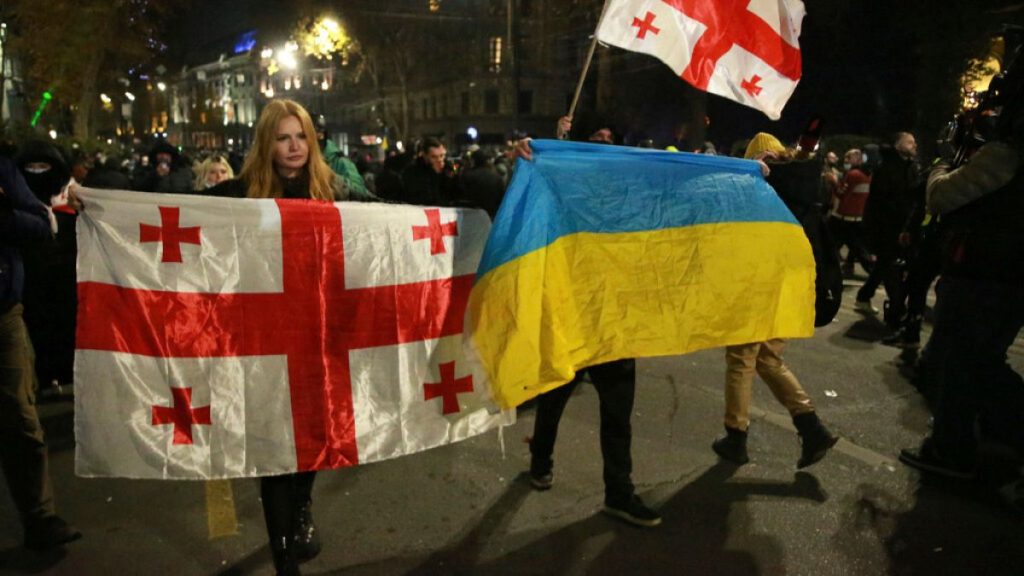Protests continued for the seventh consecutive night in Georgia following the government’s controversial decision to suspend EU accession talks. Demonstrators passionately filled the streets of Tbilisi, underscoring their demand for transparency and a commitment to European integration. The protests signify broader discontent with the Georgian Dream (GD) government, as many citizens view its actions as a setback in their longstanding ambition to join the European Union. The demonstrators rallied together, hoisting Georgian and European flags, and expressing their unwavering determination to see Georgia return to the path of EU membership. This movement reflects not only national sentiments but also broader geopolitical concerns regarding Georgia’s alignment and independence, especially in light of relations with Russia.
Ukrainian President Volodymyr Zelenskyy has expressed solidarity with the Georgian people and harshly criticized the GD government’s actions, which he believes are steering Georgia into increased dependency on Russia. In his remarks, Zelenskyy emphasized that the situation extends beyond Georgia, posing a challenge to regional stability and European aspirations. He is reportedly collaborating with international allies to formulate sanctions against the Georgian government, highlighting the international implications of the protests. Zelenskyy’s comments resonate strongly with the demonstrators’ grievances, reflecting shared values related to sovereignty and the desire for democratic governance, free from external influences that could jeopardize national autonomy.
The nature of the protests has evolved throughout the week, with earlier confrontations between riot police and demonstrators marked by water cannons, tear gas, and barricades. Initial attempts by law enforcement to suppress the protests have given way to a more restrained approach, as police refrained from intervening on the seventh night of demonstrations. This shift may reflect the government’s realization of the profound popular discontent and the desire to avoid further escalation. However, the toll of the past week’s clashes has been significant, with reports of over 300 detentions and numerous injuries among protesters. The incidents reveal a troubling trend of police brutality and crackdowns on dissent, raising concerns about the state of democracy and civil liberties in Georgia.
Amid these turbulent events, the opposition has faced severe repression. Nika Gvaramia, a prominent leader of the Coalition for Change party, was arrested during a police raid on the party’s offices, a move that many perceive as an effort to quash opposition voices and undermine the protests. Such heavy-handed tactics signal a willingness from the GD government to stifle dissent rather than engage in constructive dialogue with opposition factions. Video footage of Gvaramia’s arrest, showing visible distress and the chaotic attempts of supporters to intervene, underscores the tense atmosphere surrounding these developments. The purging of opposition leaders raises alarm bells, signaling a potential slide into authoritarianism as the government seeks to secure its hold on power.
The GD government, led by Prime Minister Irakli Kobakhidze, has responded to the protests with accusations that opposition factions are attempting to incite a revolution. Such rhetoric serves to delegitimize the demonstrators’ authentic grievances while framing the government’s response as a necessary defensive measure. By categorizing the protests as violent and revolutionary, the government aims to justify its repressive measures. However, this narrative is met with skepticism by many citizens who perceive their actions as legitimate and grounded in the desire for democratic accountability and a clear path towards European integration.
As protesters persist in their demands for transparency and EU accession, the situation remains fluid and unpredictable. The community’s resolve to gather night after night is a testament to their commitment to achieving their goals, despite the risks and challenges posed by law enforcement responses. The ongoing protests encapsulate a broader struggle for national identity and direction, rooted in historical aspirations for Europe. The fate of Georgia’s democratic trajectory hangs in the balance, with the populace poised to continue its fight against governmental overreach, underscoring their desire for the values and governance structures associated with EU membership. The international community watches closely, as the outcomes of this unrest could have significant implications for the region and the broader geopolitical landscape.



